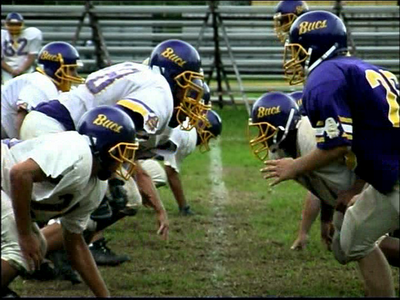
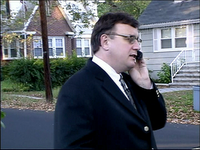 The little borough of
The little borough of
Even a small town like
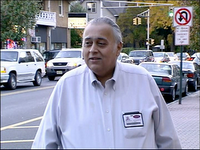 The aggrieved citizens of
The aggrieved citizens of
Enter the third contender, an independent write-in candidate named Dave Musikant. He is also legally blind, due to a tumor removed from his brain. He lives in the basement of his mother’s house. He was once team captain of the Bogota Buccaneers. Musikant immediately wins the audiences sympathy with a can-do optimism that verges on the naïve. But with no funding or experience Musikant is a long shot. He loves
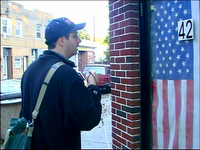 Musikant is a likeable guy, but slightly flakey. There is a touching scene showing him going door to door on a quiet small town afternoon. There is very little action, few are at home, and he stops for a moment to gaze at an American flag in a store window. We feel what this town and
Musikant is a likeable guy, but slightly flakey. There is a touching scene showing him going door to door on a quiet small town afternoon. There is very little action, few are at home, and he stops for a moment to gaze at an American flag in a store window. We feel what this town and
Things get interesting when Doug Friedline, the hired gun who orchestrated Jessie Ventura’s successful gubernatorial run, decides to join his campaign. Musikant has almost nothing to work with, save the Bogota Bucs, now in the middle of a winning season, several of whom volunteer for Musikant, but Friedline appreciates a good challenge.
All of this is shown sans narration. It is a throwback style in the vein of the great early documentarian Robert Drew, albeit a style that is more contemporary and media savvy. The story keeps within a frame of 2 months till the election. It’s all very compelling and suspenseful. Fraga and company might say that the story told itself, that they just were there to capture it, but that’s too modest. Their gargantuan task of editing hundreds of hours of footage down to a mere 90 minutes is accomplished with much artistry. A lot happens during the brief running time, and it happens very cleanly and quickly.
To proceed to the main lesson that I took home from
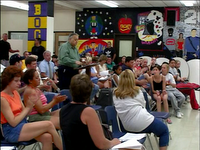 The filmmakers build suspense on election night by stretching and contracting the time before we hear the results. Cameras covering all three victory parties watch as they receive the tallies. Many viewers might be surprised at how the final vote breaks down. Lonegan wins with 1097. Pesce is second with 728. Musikant gets only 200 votes and can't hide the heartbreak written across his face. Now, I'm partisan enough to have been rooting for Lonegan the whole movie, but the final vote surprised me, especially for Pesce and Musikant, who added together couldn't have stopped Lonegan. Pesce ran a lackluster compaign, but even with a nonentity heading the ticket the democratic apparatus still made a strong showing. What did it mean?
The filmmakers build suspense on election night by stretching and contracting the time before we hear the results. Cameras covering all three victory parties watch as they receive the tallies. Many viewers might be surprised at how the final vote breaks down. Lonegan wins with 1097. Pesce is second with 728. Musikant gets only 200 votes and can't hide the heartbreak written across his face. Now, I'm partisan enough to have been rooting for Lonegan the whole movie, but the final vote surprised me, especially for Pesce and Musikant, who added together couldn't have stopped Lonegan. Pesce ran a lackluster compaign, but even with a nonentity heading the ticket the democratic apparatus still made a strong showing. What did it mean?So what is my take home lesson? Storytellers tell stories. They are naturally attracted to an interesting human narrative; but this can be deceptive. Even as an independent write-in candidate, I expected Musikant to do better. In the context of the film he seemed to be gaining a true momentum that was belied by political reality. Like much in Anytown, U.S.A., we can extrapolate a wider phenomenon. The media, after all, is full of storytellers. A quick round robin of interview clips on election eve elicits varied responses -- "Lonegan"-- "Musikaa.." -- "That Pesce guy" -- but one sideburned Bogotian says it best. It sounds like a poem, William Carlos Williams maybe:
I could tell you all day long
If that's what you want to hear.
Yeah, I'm voting for you.
I can go to Pesce and tell him
That's what you want to hear?
Yeah, I'm voting for you.
'Cause when I go in there
I close the curtain
Nobody knows who I voted for
You know?
That's when they count them up.
That's when they realize
Oh man,
Somebody lied to me.
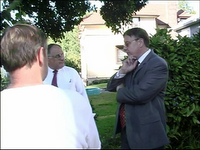 My only quibbles with the movie are unanswered questions I had afterwards that maybe could have been included in the epilogue. How did the Bogota Bucs end their season? What happened to the school and how did a winning season affect it? Was Mayor Lonegan at all responsive to citizens disturbed by plans for moving the school? I suppose all these questions can be answered by investigating the public record, but it would be nice to know now. But that's small stuff.
My only quibbles with the movie are unanswered questions I had afterwards that maybe could have been included in the epilogue. How did the Bogota Bucs end their season? What happened to the school and how did a winning season affect it? Was Mayor Lonegan at all responsive to citizens disturbed by plans for moving the school? I suppose all these questions can be answered by investigating the public record, but it would be nice to know now. But that's small stuff.Like all great documentaries, Anytown U.S.A. shows us things we might never had heard about or seen, even when they are the very familiar things all around us, and we are richer for it.








.jpg)






3 comments:
I had a friend in california send me a promo card for this documentary - how cool that you got to see it. I expected to have to wait to see it, as I'm not in a major metropolitan area.
Perhaps the possibility that liverputty has a flush and burgeoning expense account. Thank you for keeping america strong.
I can relate to the familiar things all around us. Isn't it in seeing the familiar things from other people's lives which is what's fascinating - or - insightful..
Charlie, I'll loan you my copy of the movie.
Post a Comment